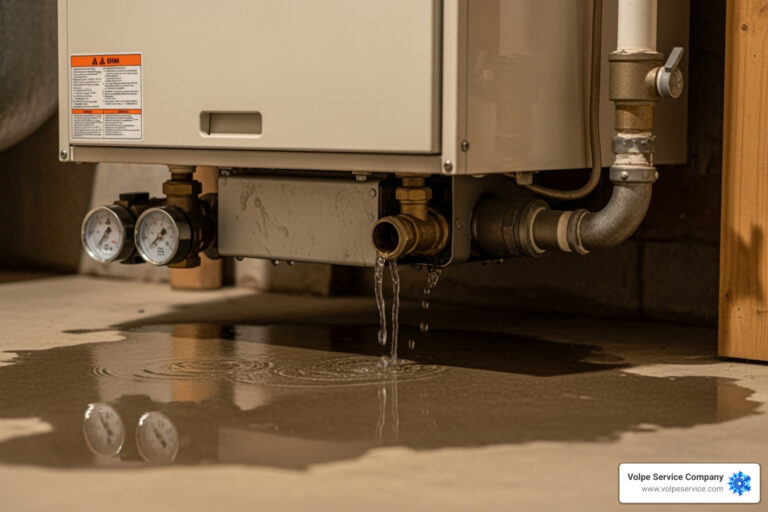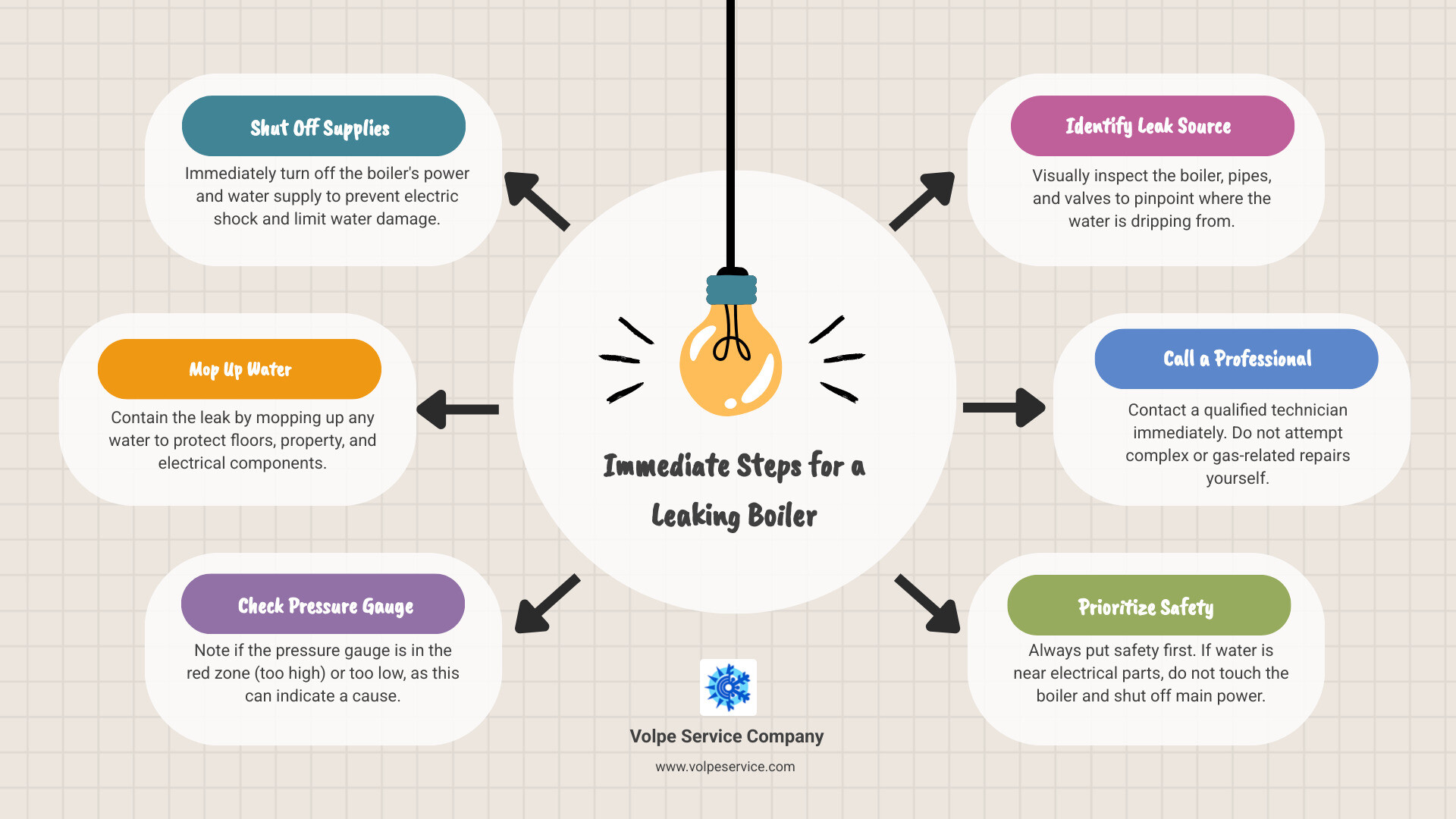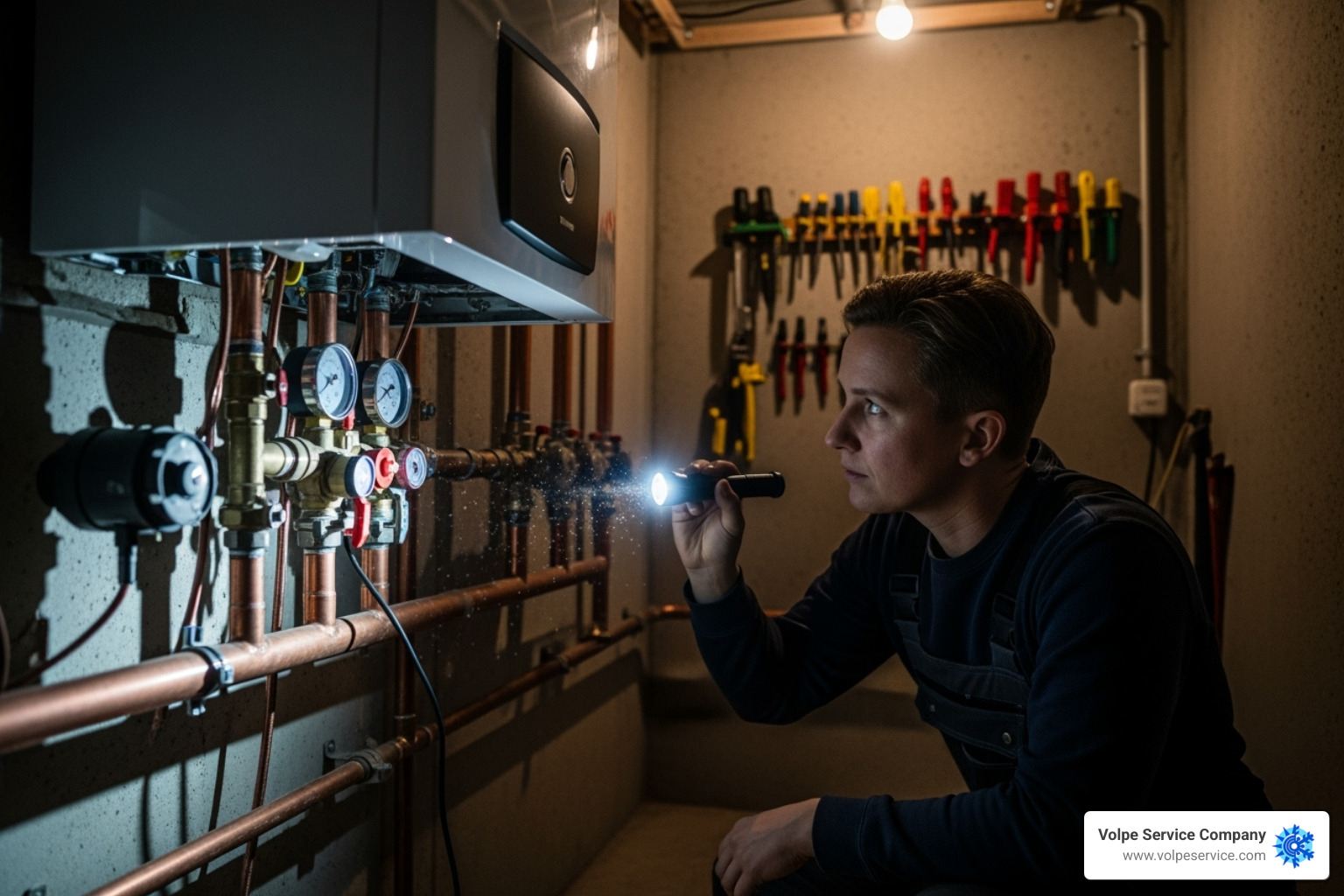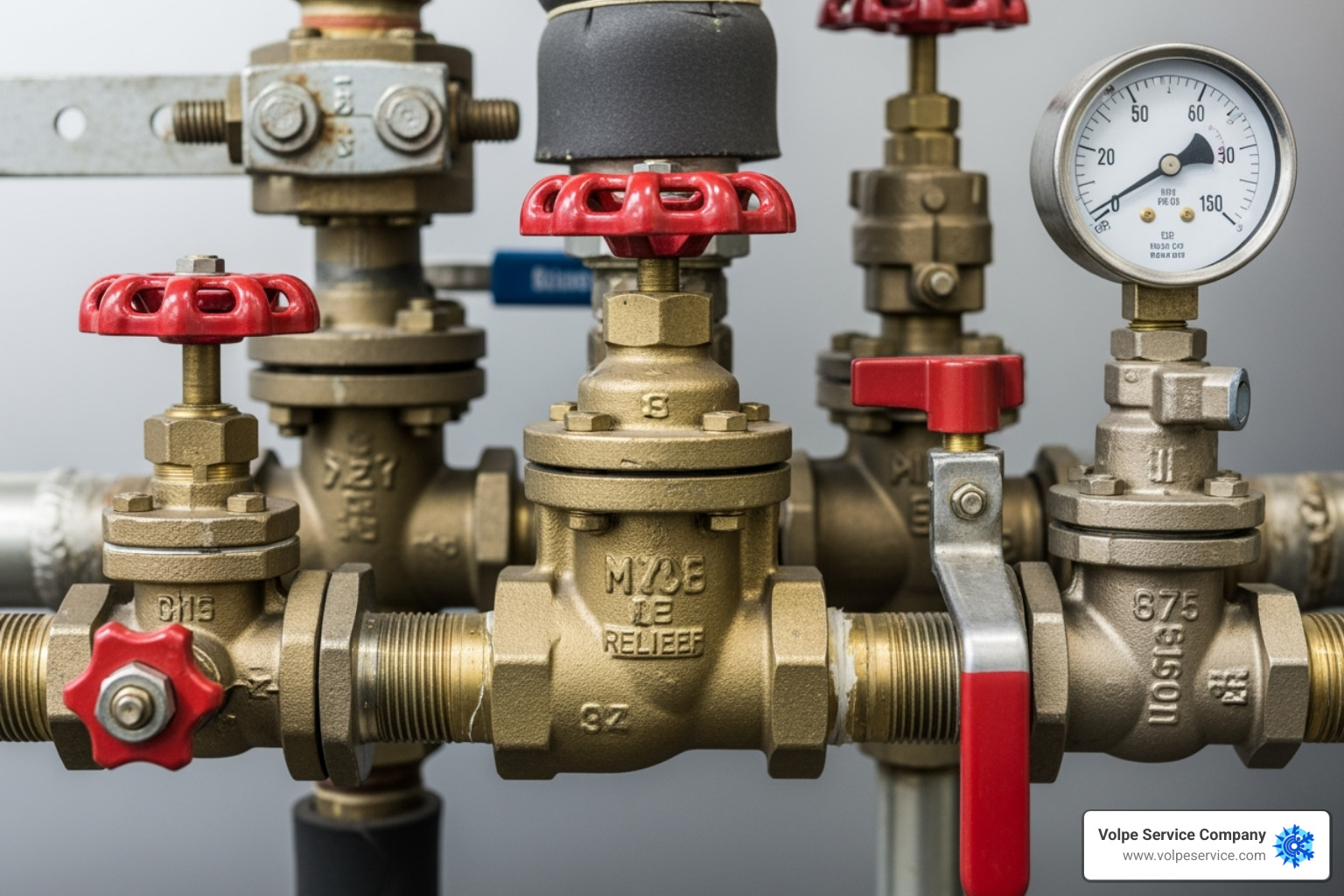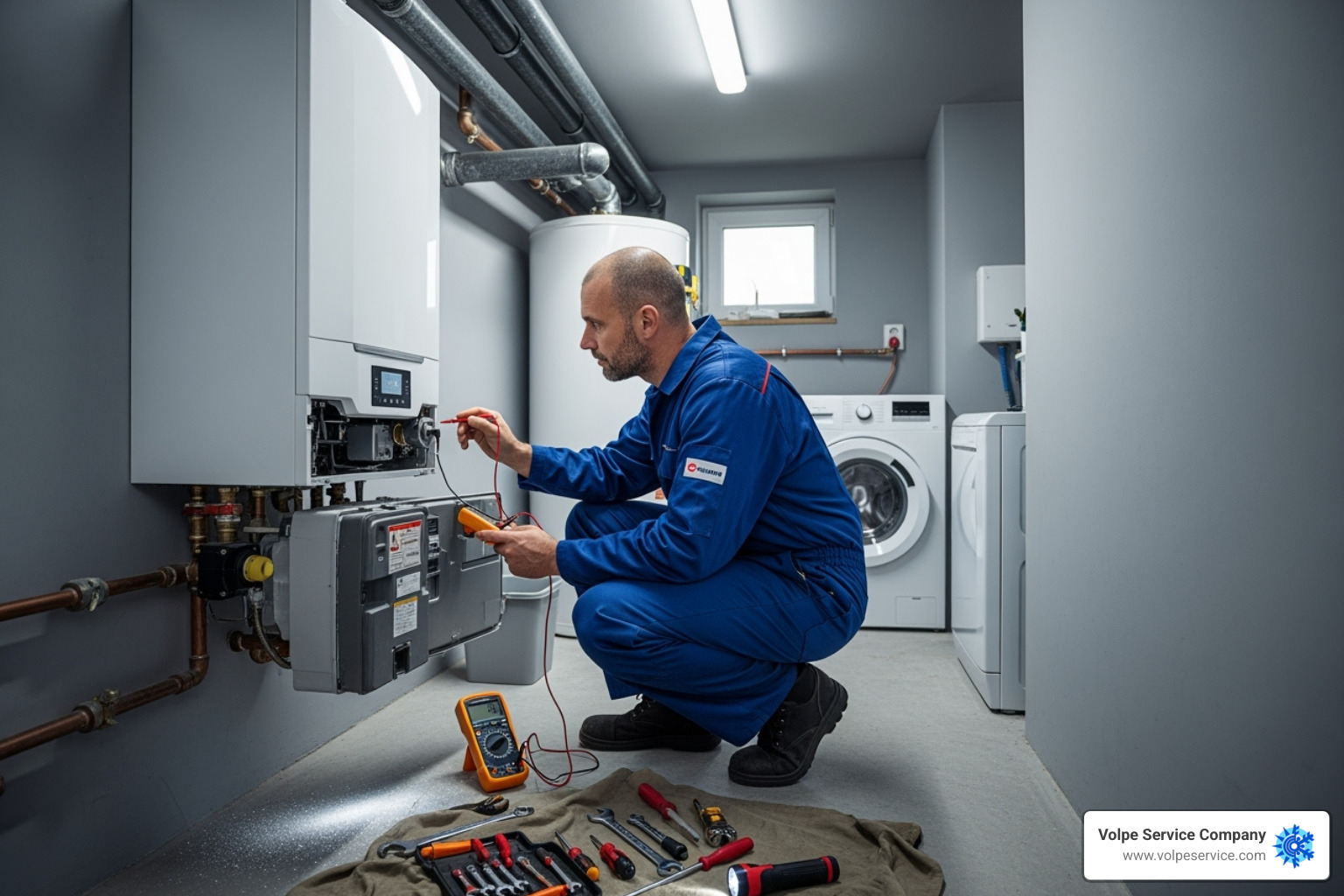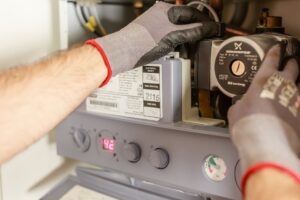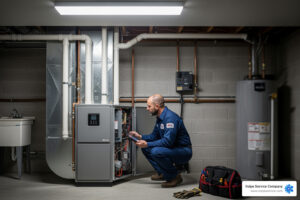When Your Boiler Starts Leaking: Why Fast Action Matters
A boiler leaking water is never normal and signals a problem that needs immediate attention. A small drip or a large puddle can quickly cause costly property damage.
Quick Answer: What to do if your boiler is leaking water:
- Turn off the boiler immediately – Switch off both the power and water supply
- Mop up any water – Prevent damage to floors and electrical components
- Check the pressure gauge – Note if it’s too high (red zone) or too low
- Look for the source – Is it dripping from pipes, valves, or the boiler itself?
- Call a professional – Don’t attempt repairs on gas appliances yourself
Finding a boiler leak can be a nightmare, but the good news is that most leaks have common causes that qualified technicians understand.
The most frequent culprits behind boiler water leaks include:
- High system pressure forcing water out through relief valves
- Worn seals and gaskets around pipes and connections
- Corroded components from age and mineral buildup
- Faulty heat exchangers with stress cracks
- Loose pipe fittings that need tightening
Modern boilers are sealed systems. Escaping water means a part has failed or loosened. While boilers last 15-20 years with good maintenance, leaks can happen at any age from pressure issues, corrosion, or wear.
Small leaks cause big problems. Even a tiny drip can lead to corrosion, electrical damage, and significant water damage to your property if ignored.
First Steps: What to Do Immediately When You Find a Boiler Leak
Finding a boiler leaking water is alarming, but calm, immediate action prevents further damage and ensures your safety. Our top priority is your well-being and the integrity of your home.
First, prioritize safety. If water is near electrical parts, do not touch the boiler. Immediately shut off its power supply to prevent electric shock and system damage. Next, turn off the main water supply valve to the boiler (or your home’s main shut-off if you can’t find the boiler’s valve) to stop more water from escaping.
With the power and water off, mop up the leak to prevent damage to floors, subflooring, and nearby electricals. Even a small puddle can cause water damage or mold over time. Addressing Boiler Leaking Problems & Solutions promptly is key.
Identifying the Source of the Leak
After securing the area, try to pinpoint where the water is coming from to help the technician diagnose the issue.
Start with a visual inspection. Look for puddles or drips, tracing water upwards to find the source, which is often higher than where water collects. Check for watermarks, rust stains, or corrosion on the casing, pipes, and connections. For intermittent leaks, dry the area completely and watch closely to see where water reappears.
Inspect all pipes and valves. Common culprits are the pressure relief valve, drain valve, and various pipe fittings. Look for wear, cracks, or loose connections. Sometimes, tightening a loose fitting can resolve a minor leak.
Common Causes of a Boiler Leaking Water and How to Fix Them
A boiler leak is a clear signal that something is wrong. Understanding the common culprits behind a boiler leaking water helps diagnose the problem faster. As explained in our guide to Boiler Heating Systems Fundamentals, boilers are sealed systems. A leak means a component has failed or there’s an imbalance, often related to pressure, corrosion, or component failure.
Pressure Problems: Too High or Too Low
One of the most frequent reasons for a boiler leaking water is its internal pressure. Check your boiler’s pressure gauge; it should be in the “green zone,” typically between 1 and 1.5 bar (15-20 PSI).
If the pressure is too high (often past 3 bar), the pressure relief valve (PRV) will release water as a safety measure. This indicates an underlying issue like an overfilled system, a malfunctioning expansion tank, or a faulty filling loop. Bleeding your radiators is a simple first step to release excess pressure.
Low pressure can also cause a leak. If the pressure drops when the boiler is off, it might be due to trapped air, which can be removed by bleeding the radiators. However, constantly low pressure suggests a hidden leak that needs a professional. Our guide on Boiler Pressure Problems and Solutions offers more details.
Faulty Valves, Seals, and Pipework
Beyond pressure, the physical condition of your boiler’s components is crucial for preventing leaks.
The pressure relief valve (PRV) itself can become faulty. If it’s worn, damaged, or blocked by sediment, it may not close properly, causing a constant leak. Learn more in our guide to Boiler Pressure Relief Valve Problems.
Worn seals and damaged gaskets are common culprits. These rubber rings around pipes and pumps deteriorate over time from temperature changes, creating leaks. Similarly, loose pipe fittings can be a cause; while a gentle tightening might help, corroded or cross-threaded fittings require a professional. The drain valve at the bottom of the boiler can also leak if loose or damaged.
Internal Corrosion and a Failing Heat Exchanger
Boiler age is a major factor in internal leaks. Over time, continuous exposure to water causes corrosion, which is accelerated by system sludge and mineral deposits. Rust-colored water is a strong sign of internal corrosion.
The heat exchanger is a vital and expensive component where water is heated. Constant temperature changes can cause stress fractures or cracks, leading to a boiler leaking water. A sign of a failing heat exchanger is a “kettling” noise (rumbling or whistling) caused by mineral buildup. A punctured heat exchanger can cause pressure spikes. If your boiler is noisy, see our article on Boiler Making Knocking Sounds.
Understanding Leaks in Different Boiler Types
While many leak causes are universal, different boiler types have unique components prone to specific issues.
| Boiler Type | Common Leak Sources | Notes |
|---|---|---|
| Hydronic Boilers | Circulator pump seals, Expansion tank, Pressure relief valve, Radiators, Piping (especially older systems) | These systems circulate hot water through a network of pipes to radiators or baseboard heaters, known for their efficiency and even heat. |
| Steam Boilers | Sight glass, Low-water cut-off, Return lines, Steam traps, Valves, Piping (corrosion) | These generate steam for heating, requiring more frequent maintenance and careful water level management due to the nature of steam. |
Hydronic boilers (hot water boilers) are common. Leaks often start at the circulator pump seals or the expansion tank. A ruptured expansion tank diaphragm causes pressure instability and leaks.
Steam boilers operate at higher temperatures and have unique parts like the sight glass, low-water cut-off, and steam traps that can leak. Condensate return lines are also common leak spots in both boiler types. Fixing return line leaks can significantly reduce energy costs by around 10%!
DIY Fixes vs. Calling a Professional: Knowing Your Limits
When your boiler is leaking water, it’s tempting to try a DIY fix. However, boilers are complex and not like a simple leaky faucet. They operate under high pressure and temperature, and gas models add more risk. Safety risks are serious, including electric shock, gas leaks, or worsening the problem.
Legally, many areas require that only Gas Safe engineers or other qualified technicians work on boilers. DIY repairs can void your warranty and often turn a simple fix into a major, costly repair. Our guide on Boiler Repair Top Indicators can help you decide when to call an expert.
Simple Checks and Fixes for a boiler leaking water
While major repairs are for pros, you can perform a few homeowner-safe boiler checks for a boiler leaking water. These are first-line defense steps for minor issues.
- Tightening pipe connections: If you spot a drip from a pipe fitting, you can gently try tightening it with a wrench. Be careful not to overtighten, which can cause more damage.
- Bleeding radiators: This can help if your boiler pressure is too high. Releasing trapped air also releases some system pressure, which might stop a pressure-related drip. Our Boiler Low Water Pressure Fixes guide explains this process.
- Checking the filling loop tap: This valve connects your boiler to the main water supply. If left slightly open, it can cause high pressure. Ensure it’s fully closed.
- Resetting the boiler: For minor, intermittent issues, a simple reset can sometimes clear temporary glitches. However, if you need to do it regularly, it signals a deeper problem requiring a professional.
If these steps don’t solve the problem, or if you’re uncertain, it’s time to call in the professionals.
Serious Signs That Mean You Need an Expert Now
Some situations with a boiler leaking water require immediate professional attention. These red flags mean you should turn off your boiler and call for help right away.
- Water near electrical components: This is an emergency. Dripping on wiring or controls creates a risk of electric shock and severe damage. Shut off the power and call for help immediately.
- Major corrosion: Extensive rust on the casing or pipes suggests serious structural problems and that the boiler may be near the end of its life.
- Cracked boiler casing: This is a critical warning of internal pressure problems or structural failure. Stop using the boiler immediately.
- Persistent pressure drops: If you constantly have to add water to the system, there is a leak somewhere that needs professional diagnosis.
- No heat or hot water: When this happens alongside a leak, it usually indicates a significant malfunction beyond a simple fix.
For any of these serious signs, turn off the boiler and water supply, then contact a qualified professional. Our team provides Boiler Repair Service Chester NJ and is ready to help.
The Financial Impact and Prevention of Boiler Leaks
A boiler leaking water is more than an inconvenience; it’s a financial drain. A boiler should last about 20 years with proper care, but an unchecked leak can shorten its lifespan, forcing a costly early replacement. Beyond the repair cost, leaks can cause property damage like ruined flooring and mold. A leaky boiler is also inefficient, losing water and heat, which drives up utility bills. Fixing leaks can cut energy costs by about 10%. For more tips, see our HVAC Resources Parsippany NJ.
Estimating Repair Costs for a boiler leaking water
The cost to fix a boiler leaking water varies based on the cause and severity. A simple fix like tightening a fitting is inexpensive, but a major component failure can be costly. For example, replacing a faulty pressure relief valve is manageable. But a cracked heat exchanger is a critical and expensive repair. For older boilers, a full replacement often makes more financial sense. A new boiler can be a significant investment, potentially costing $5,000 or more, plus labor. Our technicians provide clear, transparent estimates before any work begins.
The Power of Prevention: How Regular Maintenance Saves Money
The best way to avoid the cost and hassle of a boiler leaking water is prevention. We recommend an annual service for your boiler, ideally before the heating season begins. During a check-up, a technician inspects components, checks pressure, cleans parts, and spots minor issues before they become major leaks. This proactive approach prevents corrosion and sludge buildup.
Consider a system flushing to clear debris and limescale. Installing a magnetic filter also helps by capturing metallic particles that cause corrosion. Regular maintenance and cleaning saves on energy and extends your boiler’s life. Our Chester NJ Boiler Maintenance services are designed to keep your system in peak condition.
Frequently Asked Questions about Boiler Leaks
Can I still use my boiler if it’s leaking?
No. If your boiler is leaking water, do not use it. Immediately turn off the power and water supply. A leak can cause electrical hazards, significant property damage, and worsen the original problem, leading to more expensive repairs. For your safety, stop using the boiler and call a professional.
Is a small drip from my boiler a serious problem?
Yes. Any leak, no matter how small, is a sign that something is wrong. A small drip can lead to hidden problems like:
- Corrosion: Constant dripping can eat away at other boiler components.
- Electrical Damage: Water reaching wiring can cause a short circuit or fire.
- Mold Growth: Hidden moisture can lead to mold behind walls or under floors.
A small drip often indicates an underlying issue like high pressure or a failing seal. Addressing it quickly saves you from a bigger, costlier problem later.
How often should my boiler be serviced to prevent leaks?
We highly recommend servicing your boiler annually. An annual check-up by a qualified technician helps catch small issues before they become big problems. During a yearly service, a technician inspects the boiler, checks pressure, looks for wear, cleans buildup, and tests safety devices. This is the best way to prevent unexpected leaks, ensure efficient and safe operation, and extend your boiler’s lifespan. It’s a small investment for peace of mind.
Your Partner in Boiler Safety and Reliability
Dealing with a boiler leaking water is manageable if you know the right steps. This guide covered immediate actions like turning off power and water, cleaning up, and identifying the leak’s source. We also explored common causes, from pressure problems and faulty valves to serious issues like internal corrosion and failing heat exchangers.
We’ve emphasized the difference between simple checks and serious signs requiring a professional. Your safety is paramount. Issues like water near electricals, major corrosion, a cracked casing, or persistent pressure drops are not DIY jobs. Boilers are complex and dangerous systems. Attempting repairs without proper training is risky, can void warranties, and may turn a simple fix into a costly replacement.
Since 1963, Volpe Service Company has helped New Jersey families with their heating needs. Our licensed, certified technicians use data-driven solutions to solve problems correctly the first time. We understand a boiler leaking water is disruptive, so we provide quick, reliable diagnosis and guaranteed service.
Whether you have a minor drip or a major leak, need emergency repairs, or want to schedule maintenance, we can help. Our honest approach ensures you understand the problem, the solution, and how to prevent future issues. Don’t let a leaking boiler compromise your comfort or safety. For expert boiler service in East Hanover, Parsippany, Mt Olive, Chester, or our New Jersey service area, we’re ready to provide peace of mind. Visit our Boilers Parsippany NJ page to learn how we can keep your heating system running safely and efficiently.


